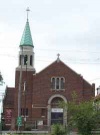|
| |||||
St. Barbara Church
From Brooklyn Centre Wiki
| Address: | St. Barbara Church 1505 Denison Avenue Cleveland, Ohio |
| Affiliation: | Roman Catholic |
| Organized: | 1905 |
| Pastor: | Fr. Michael Dietz |
| Neighborhood: | West 15th St and Denison Avenue area |
Contents |
History
- St. Barbara's, a Roman Catholic Church, was first organized in 1906 on Valley Road.
- The location made it difficult for parishioners from around Denison Avenue to attend, especially during the winter and when the dirt road was wet and muddy.
- When the church burnt down in 1913, some parishioners were eager to have the church rebuilt elsewhere, preferably on Denison.
- In 1916, Bishop John P. Ferrelly purchased six lots from Caroline Loomis. The lots, part of the Petty and Baldwin Allotment, were all facing on Denison Avenue.
- In the Polish parish of St. Barbara, Father Joseph S. Jarosz broke ground on Denison Avenue at West 15th Street in July, 1950, for the construction of a new brick church in the Lombard round-arch style, capable of seating 650 people. Distinctive of the attractive structure is a 65-foot tower and the stained glass windows dipicting the seven sacraments. Archbishop Hoban dedicated it July 13, 1952.
- Source: "History of the DIOCESE OF CLEVELAND", page 422
- In the Polish parish of St. Barbara, Father Joseph S. Jarosz broke ground on Denison Avenue at West 15th Street in July, 1950, for the construction of a new brick church in the Lombard round-arch style, capable of seating 650 people. Distinctive of the attractive structure is a 65-foot tower and the stained glass windows dipicting the seven sacraments. Archbishop Hoban dedicated it July 13, 1952.
- This Polish parish was known as Barbarowa, pronounced using a "V" in place of the "W", thus "Barba-roVa".
School
- The elementary school served the Polish community by providing education for children from Kindergarten thru 8th grade.
- Teachers at the school were nuns from the The Sisters of Saint Joseph order. They were housed in the convent house behind the school building (on West 16th St.)
Transition
- In the early 1960's, word came down from Cuyahoga County officials that a proposed highway would bisect the neighborhood. This was bad news for the people who had bought their homes and planned to live the rest of their lives there. A study of deed transfers shows that a small number of speculators jumped in and bought some properties. They probably knew what sort of price the State of Ohio Dept. of Transporatation was paying for properties acquired for freeways and paid the frantic sellers a lower price, hoping to make a profit from the true value. On the flip side of the coin, the sellers may have wanted to move quickly instead of waiting for the slow wheels of government to move, so jumped at the chance to be out of their property.
- After all the property was bought up on the east side of W.15th, the west side of W.14th and the north side of Redman, bulldozers moved in to begin demolition. It was an odd sight to be able to see straight across from the houses that were left on the eastern portion over to the houses that were on the western side.
Additonal Readings
- Miller, Carol Poh, 1950-
- Barbarowa: cultural resource report on a neighborhood of Cleveland. [1993]
- F499.C66 B376 1993a
- Miller, Carol Poh, 1950-
- Wang, Charissa Y. (editor)
- A history of the Barbarowa Neighborhood, Cleveland, Ohio
- submitted by Hardlines: Design & Delineation ; submitted to
- Burgess and Niple, Limited ; contributors, Roy A. Hampton
- III, historian.
- Barbarowa Neighborhood, Cleveland, Ohio
- Columbus, Ohio : Hardlines, [1999]
- Item Description: 77 p. : ill., maps ; 28 cm.
- F499.C66 B37 1999
Other Polish settlements in Cleveland were:
- Kantowa (near East 71st and Grant Ave.)
- Krakowa (Lansing Ave. and East 71st)
- Jackowa
- Josephatowa (East 33rd and St. Clair)
- Poznan (near East 79th and St. Clair Ave.)
- Warszawa (East 65th near Fleet Ave.)


